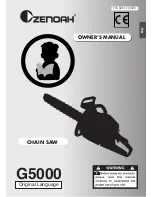
11
WARNING
When servicing, use only iden ti cal Ryobi replacement
parts. Use of any other parts may create a hazard or
cause product damage.
WARNING
Always wear safety goggles or safety glasses with
side shields during power tool operation or when
blowing dust. If operation is dusty, also wear a dust
mask.
GENERAL MAINTENANCE
Avoid using solvents when cleaning plastic parts. Most
plastics are susceptible to damage from various types of
commercial solvents and may be damaged by their use. Use
clean cloths to remove dirt, dust, oil, grease, etc.
WARNING
Do not at any time let brake fl uids, petrol, petroleum-
based products, penetrating oils, etc., come in contact
with plastic parts. Chemicals can damage, weaken or
destroy plastic which may result in serious personal
injury.
LUBRICATION
All of the bearings in this tool are lubricated with a suffi cient
amount of high grade lubricant for the life of the unit under
normal operating conditions. Therefore, no further lubrication
is required.
REPLACING THE GUIDE BAR AND CHAIN
See Figures 34 - 43.
DANGER
Never start the engine before installing the guide bar,
chain, drivecase cover, and clutch drum. Without all
these parts in place, the clutch can fl y off or explode,
exposing the user to possible serious injury.
WARNING
To avoid serious personal injury, read and understand
all the safety instructions in this section.
■
Always place the switch in the STOP “
” position before
you work on the saw.
■
Make sure the chain brake is not set by pulling the chain
brake lever/hand guard towards the front handle to the
run position.
NOTE: When replacing the guide bar and chain, always use
the specifi ed bar and chain.
■
Wear gloves when handling the chain and bar. These
components are sharp and may contain burrs.
■
Remove the bar mounting nuts using the combination
wrench provided.
■
Remove the clutch cover.
■
Remove the bar and chain from the mounting surface.
■
Remove the old chain from the bar.
■
Lay out the new saw chain in a loop and straighten any
kinks. The cutters (A) should face in the direction of chain
rotation (B). If they face backwards, turn the loop over.
■
Place the chain drive links (C) into the bar groove (D) as
shown.
■
Position the chain so there is a loop at the back of the
bar.
■
Hold the chain in position on the bar and place the loop
around the sprocket (E).
■
Fit the bar fl ush against the mounting surface so that the
bar studs are in the long slot of the bar.
NOTE:
When placing the bar on the bar studs (F), ensure
that the adjusting pin (G) is in the chain tension pin hole
(H).
■
Replace the clutch cover (I) and bar mounting nuts (J).
■
Finger-tighten the bar mounting nuts. The bar must be
free to move for tension adjustment.
■
Remove all slack from the chain by turning the chain
tensioning screw (K) clockwise until the chain seats snugly
against the bar with the drive links in the bar groove.
■
Lift the tip of the guide bar up to check for sag.
■
Release the tip of the guide bar and turn the chain
tensioning screw 1/2 turn clockwise. Repeat this process
until sag does not exist.
■
Hold the tip of the guide bar up and tighten the bar
mounting nuts securely.
The chain is correctly tensioned when there is no sag on
the underside of the guide bar, the chain is snug, but it can
be turned by hand without binding. Ensure that the chain
brake is not set.
NOTE: If chain is too tight, it will not rotate. Loosen the
bar nuts slightly and turn the tension adjuster 1/4 turn
counterclockwise. Lift the tip of the guide bar up and
retighten the bar nuts securely. Ensure that the chain will
rotate without binding.
MAINTENANCE








































